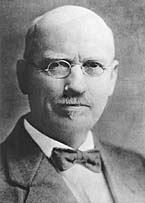Johan August Udden (1859-1932)
Dr. Johan August Udden was born at Lekasa, Sweden, March 19, 1859. Two years later he came to America with his parents, who settled in Minnesota. Udden graduated with a Bachelor’s degree from Augustana College, Rock Island, Illinois, in 1881 and was married to Johanna Kristina Davis in 1882. He was a student at the University of Minnesota in 1886 and received an MA degree from Augustana College in 1889. From 1881 to 1888 he taught natural science and civics at Bethany College, Lindsborg, Kansas, and from 1888 to 1911 was Professor of Natural History and Geology at Augustana College. Although giving temporary service in 1903-1904, his permanent connection with UT began in 1911 and continued until his death, January 5, 1932.
settled in Minnesota. Udden graduated with a Bachelor’s degree from Augustana College, Rock Island, Illinois, in 1881 and was married to Johanna Kristina Davis in 1882. He was a student at the University of Minnesota in 1886 and received an MA degree from Augustana College in 1889. From 1881 to 1888 he taught natural science and civics at Bethany College, Lindsborg, Kansas, and from 1888 to 1911 was Professor of Natural History and Geology at Augustana College. Although giving temporary service in 1903-1904, his permanent connection with UT began in 1911 and continued until his death, January 5, 1932.
During his tenure at Augustana College, Dr. Udden taught the various courses in botany, zoology, physiology, meteorology, and geology during all these years, and at times he helped out in remote fields, such as history. Even with this crushing teaching load he published 46 papers. Using a horse, he studied the geology within 30 miles of Rock Island in great detail. He compiled a detailed picture of the artesian groundwater system in the area and used well cuttings and driller’s logs to establish the subsurface stratigraphy. He recognized the potential value of well cuttings in a variety of geological endeavors and demonstrated this to the oil industry by establishing the first subsurface geology laboratory when he assumed directorship of the Texas Bureau of Economic Geology. In 1914 from a study of cuttings from a deep well in West Texas, he demonstrated the occurrence of extensive deposits of potash salts in the Permian basin.
The training of his student days was general and afforded no opportunity for specialization. In the geologic sciences Udden was, therefore, largely self-trained. For this reason he early came to the conclusion that his best contribution to geology would come through close observations in limited and, in the main, neglected fields of geology. Thus almost the first of his papers, published in 1893, was one on the geologic processes involved in the formation of pellets. In 1894 came the first of his papers on sedimentary processes of the atmosphere, a line of investigation carried through several years culminating in his important publication on the mechanical composition of loess and other wind deposits. As an outgrowth of this work he established a geometric grain-size scale that became the norm in the geological sciences. In 1895 he published on fossil frost impressions and again in 1918 on fossil ice crystals.
While many of his papers are records of observations, theoretical deductions are not wanting. It was on theoretical grounds likewise that Dr. Udden advised the Regents of the University in 1916 of the probable occurrence of oil and gas in the University lands of west Texas. In 1905 he flew a model helicopter of his design.
Udden was connected with several geological survey organizations. He was Special Assistant to the Iowa Geological Survey, working chiefly during the summer months, in the years 1897 to 1903; Geologist of The UT Mineral Survey, 1903-1904; Geologist of the Illinois Geological Survey, 1906-1911; Special Agent of the U.S. Geological Survey, 1908-1914. He became Geologist in the Bureau of Economic Geology and Technology of UT in 1911 and Director in 1915. He was made a member of the Graduate Faculty of the University in 1929, and was affiliated with the Department of Geology, but did not teach classes nor did he supervise students.
Udden received four honorary degrees: PhD, Augustana College, 1900; DSc., Bethany College, 1921; D Sc, Texas Christian University, 1923; and Doctor of Laws, Augustana College, 1929. He held membership in several scientific societies including the American Association for the Advancement of Science, (Fellow, 1906) Geological Society of America, American Association of Petroleum Geologists, Sigma Xi, and the Illinois, Iowa, Oklahoma, and Texas (Fellow) Academies of Science. In 1929 he was elected honorary member of the Society of Economic Paleontologists and Mineralogists. In recognition of his distinguished service in sciences Dr. Udden was knighted in 1911 by King Gustavus Fifth of Sweden.